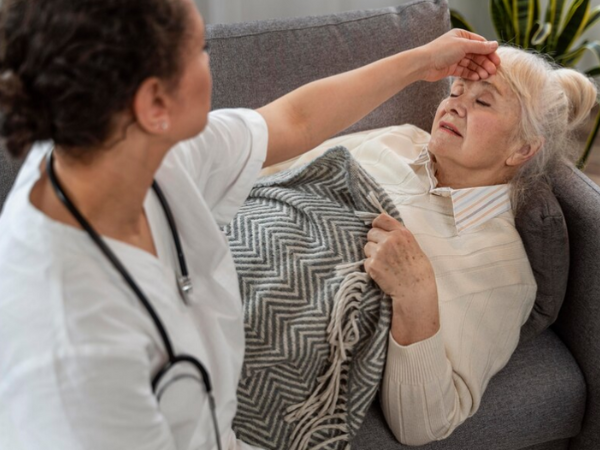
19 Apr Overcoming Complications in the Journey of Stroke Recovery
In healthcare, a stroke stands out as one of the most urgent and life-changing events. It happens when the brain doesn’t get enough blood flow suddenly, causing serious health problems.
Acting fast is key when someone has a stroke because quick medical help can reduce damage and make things better. But what really affects a person’s life are the problems that stick around after the stroke.
These challenges are different for everyone, like not being able to move one side of their body or having trouble speaking. And for older people, things can slowly get worse over time after a stroke, leading to a decline in health and how well they can do things.
To really help stroke survivors, we need to understand these lasting issues and keep giving them support even after the initial crisis. Doctors and caregivers have a big role in this.
They create personalized plans to help stroke survivors based on what they need. By focusing on rehab and finding ways to prevent more strokes, we can make life better for people dealing with the aftermath of a stroke.
Now that we understand the urgency of responding to a stroke, let’s explore the challenges that survivors encounter in the aftermath.
Complications Faced by Stroke Survivors
After a stroke, survivors face many challenges that stick around long after the event. These challenges range from physical difficulties to problems with thinking.
Many stroke survivors have issues like paralysis, trouble speaking, or problems with memory and thinking. Older people who have strokes might have even more trouble because of aging, which can exacerbate the long-term complications of stroke.
As people get older, their bodies may not bounce back as quickly, making recovery harder. The effects of a stroke can make it tough for survivors to move around and do everyday tasks.
Muscle weakness or trouble coordinating movements can lead to less independence and a lower quality of life, often requiring help from caregivers.
Besides physical problems, stroke survivors also have a higher chance of having another stroke and facing issues with thinking, known as neurological complications of stroke.
The first stroke can harm blood vessels or affect how the brain works, increasing the risk of more strokes. Memory problems, trouble paying attention, and difficulty solving problems can make it hard for survivors to do things on their own.
Healthcare professionals and caregivers need to understand and deal with all these challenges to help stroke survivors. Rehabilitation usually involves a mix of therapies to improve movement, speech, and thinking, addressing complications of stroke.
It’s also crucial to manage health conditions like high blood pressure and diabetes to prevent more strokes and keep survivors healthy in the long run, especially for the stroke complications in elderly.
By recognizing and meeting the different needs of stroke survivors with personalized care, healthcare providers and caregivers can help improve their lives after a stroke.
While strokes present significant challenges for survivors of all ages, older individuals often encounter additional complexities due to age-related factors.
After a stroke, older people often face challenges that can complicate their recovery, especially considering their age. These challenges may include difficulties in adjusting to changes in mobility, communication, and daily activities.
Additionally, older individuals may encounter challenges related to managing multiple health conditions concurrently, which can further hinder their recovery process..
These stroke complications in elderly can be more severe due to age-related factors, such as existing health issues or decreased strength.
It’s crucial for caregivers and doctors to recognize signs of decline after stroke, such as increased difficulty moving around, cognitive issues, or heightened dependence on others.
Many older stroke survivors experience ischemic stroke complications, which occur when a blood clot blocks a brain blood vessel, reducing blood and oxygen supply to brain cells. This can lead to a higher risk of future strokes and long-term cognitive problems.
To assist older stroke survivors, caregivers and doctors must closely monitor their condition to identify any issues early and prevent them from worsening.
Caregivers play a vital role in providing personalized care and support to improve the lives of elderly stroke survivors.
By being vigilant for problems related to ischemic strokes and developing tailored plans for each individual’s needs, caregivers can significantly contribute to the recovery and overall well-being of older stroke survivors, enhancing their quality of life.
Conclusion
After a stroke, survivors face many ongoing challenges that affect them physically, mentally, and emotionally for a long time.
It’s crucial for caregivers and healthcare providers to understand these challenges and provide comprehensive support to stroke survivors.
By addressing physical, cognitive, and emotional needs, we can help improve the quality of life for stroke survivors and their families.
In addition to addressing the immediate needs of stroke survivors, ongoing rehabilitation and support play a crucial role in their long-term recovery journey.
Rehabilitation efforts, including physical therapy, speech therapy, and cognitive interventions, should be continued well beyond the acute phase of stroke to maximize functional outcomes and independence.
Furthermore, establishing a strong support network comprising healthcare professionals, caregivers, and community resources can provide ongoing guidance and assistance to stroke survivors and their families.
By prioritizing comprehensive care and ongoing support, we can empower stroke survivors to lead fulfilling lives despite the challenges they may face.
Additionally, seeking support from a psychiatrist in Patna or consulting the best psychiatrist in Patna, Bihar, can be beneficial for addressing any emotional challenges that may arise after a stroke.
Emotional well-being is an integral part of stroke recovery, and professional assistance can aid in addressing any mental health concerns effectively.
With personalized help and proactive management, we can help stroke survivors feel better and more hopeful as they navigate their recovery journey.

No Comments